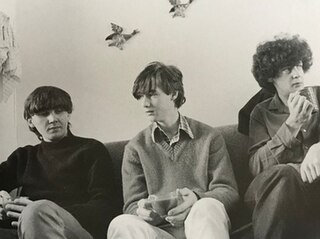
Aztec Camera were a Scottish pop/new wave band founded by Roddy Frame, the group's singer, songwriter and only consistent member. Established in 1980, Aztec Camera released a total of six studio albums: High Land, Hard Rain (1983), Knife (1984), Love (1987), Stray (1990), Dreamland (1993) and Frestonia (1995). The band garnered popular success for the songs "Oblivious", "Somewhere in My Heart" and "Good Morning Britain".

Edwyn Stephen Collins is a Scottish musician, producer and record label owner from Edinburgh. Collins was the lead singer for the 1980s post-punk band Orange Juice, which he co-founded. After the group split in 1985, Collins started a solo career. His 1994 single "A Girl Like You" was a worldwide hit.

Roddy Frame is a Scottish singer-songwriter and musician. He was the founder of the 1980s new wave band Aztec Camera and has undertaken a solo career since the group's dissolution. In November 2013, journalist Brian Donaldson described Frame as: "Aztec Camera wunderkind-turned-elder statesman of intelligent, melodic, wistful Scotpop."
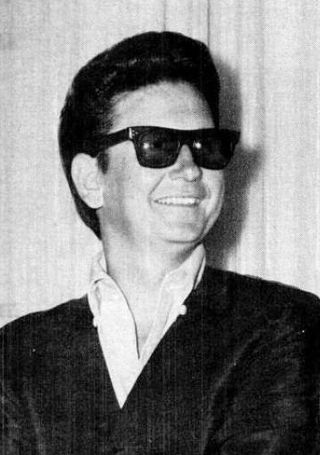
Roy Orbison was an American singer-songwriter who found the most success in the early rock and roll era from 1956 to 1964. He later enjoyed a resurgence in the late 1980s with chart success as a member of the Traveling Wilburys and with his Mystery Girl album, which included the posthumous hit single "You Got It". At the height of his popularity, 22 of Orbison's songs placed on the US Billboard Top 40 chart, and six peaked in the top five, including two number-one hits. In the UK, Orbison scored ten top-10 hits between 1960 and 1966, including three number-one singles.

"Women in Uniform" is a 1978 song by the Australian band Skyhooks; it was written by the band's bass guitar player, Greg Macainsh. It was released in February 1978 as the lead single from their fourth studio album, Guilty Until Proven Insane and peaked at number 8 in Australian and number 73 in the UK.
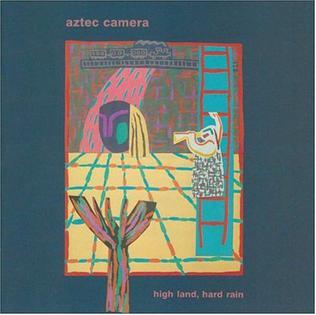
High Land, Hard Rain is the debut album by jangle pop band Aztec Camera, released in 1983. Three tracks from the album originally appeared on the Oblivious EP, which reached number 18 on the UK Singles Chart when re-released in November 1983. The album itself reached number 22 on the UK Albums Chart.

The discography of British-American band Fleetwood Mac consists of 18 studio albums, 10 live albums, 23 compilation albums, one extended play and 62 singles. The band also has sold over 120 million records worldwide, making them one of the best-selling music artists of all time.

"Crying in the Rain" is a song composed by Carole King with lyrics by Howard Greenfield, originally recorded by American duo the Everly Brothers. The single peaked at number six on the US Billboard Hot 100 in 1962.
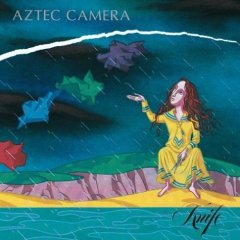
Knife is the second album by Scottish indie pop group Aztec Camera, released on 21 September 1984. It reached number 14 on the UK Albums Chart – their highest showing at that time. It also charted at No. 29 on the Swedish Albums Chart.

Love is the third studio album by Scottish pop group Aztec Camera, released in November 1987 on Sire. While it was released under the Aztec Camera name, Roddy Frame was the only remaining permanent member of the group and he recorded the album alongside a group of session musicians. Departing from the indie and folk-rock approach of earlier records, Love incorporated R&B influences, seemingly to break the American market. It failed to do so but did achieve commercial success in the UK, reaching No. 10 on the albums chart, following the success of its third single "Somewhere in My Heart", which reached No. 3 on the UK Singles Chart. As a result, it became the band's most commercially successful album.
Carroll Thompson is a British lovers rock singer, best known as the "Queen of Lovers Rock"

"Somewhere in My Heart" is a song by Scottish band Aztec Camera. It was released as the third single from their third studio album, Love (1987). The song was produced by Michael Jonzun and written by Roddy Frame. Released as a single in 1988, the track peaked at number three on the UK Singles Chart and became a top-40 hit in Australia and Ireland. The music video was directed by John Scarlett-Davis and produced by Nick Verden for Radar Films.

Dreamland is the fifth studio album by the alternative rock band Aztec Camera, released in 1993.
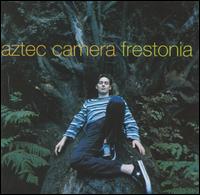
Frestonia is the sixth and final studio album by the Scottish band Aztec Camera, released in 1995. Roddy Frame's subsequent releases would be under his own name. The title of the album refers to the community of Frestonia, in the Notting Hill district of London.

The Hit Pack is a compilation that can be seen as a continuation to the Hits compilation series; therefore, it is also called Hits 13 and The Hits Album 13 on some music streaming services, such as Spotify. It was originally issued by BMG, CBS, and WEA in December 1990 and reached number 2 on the UK Top 20 Compilations Chart. The album was released as a 21-track CD, while the cassette format contained 24 tracks.
"All I Need Is Everything" was the first single off the album Knife by Scottish new wave band Aztec Camera. The single was released in September 1984 and reached number 34 on the UK Singles Chart, remaining on the chart for six weeks. The single version is two minutes shorter than the album version, which has an extended fadeout. According to a 1984 interview with Roddy Frame, the song was written in March 1984 while he was touring the United States. Frame called it an "unusual choice for a single, because unlike our previous singles it doesn't have a recurrent chorus at all." The song's music video was in light rotation on MTV in autumn 1984.

"Good Morning Britain" is a song by Scottish band Aztec Camera featuring special guest Mick Jones. It was released as the second single from their 1990 studio album Stray. The song was written by Aztec Camera frontman Roddy Frame. It reached number 19 on the UK Singles Chart, and number 12 on the U.S. Alternative Songs chart.
This is a discography for the Scottish new wave band Aztec Camera.

The discography of American rapper and singer Roddy Ricch, consists of two studio albums, two extended plays, three mixtapes, and 55 singles. His debut studio album, Please Excuse Me for Being Antisocial (2019), debuted at number one on the US Billboard 200. The album includes the singles "Big Stepper", "Start wit Me", "Tip Toe", "The Box", and "High Fashion". "The Box" became Roddy Ricch's highest-charting song worldwide, spending eleven weeks at number one on the US Billboard Hot 100; as well as topping the charts in Canada, New Zealand, Hungary, and peaking at number two in both the United Kingdom and Ireland. His second studio album, Live Life Fast debuted at number four on the US Billboard 200. The album was proceeded with one single, "Late at Night" and Ricch's second studio album was a flop in comparison to his previous album and some people believe that he was another prominent young artist to succumb to the sophomore slump. Through 2021 and 2022 Ricch released a total of ten singles, with only four of those solo.
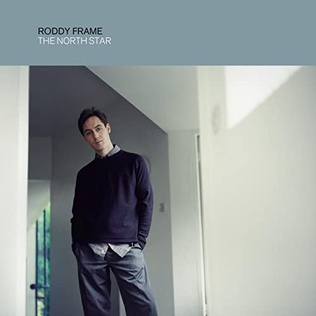
The North Star is the debut album by Scottish singer-songwriter Roddy Frame, released in September 1998 by Independiente. It features the single "Reason for Living", which peaked at number 45 on the UK Singles Chart.

















